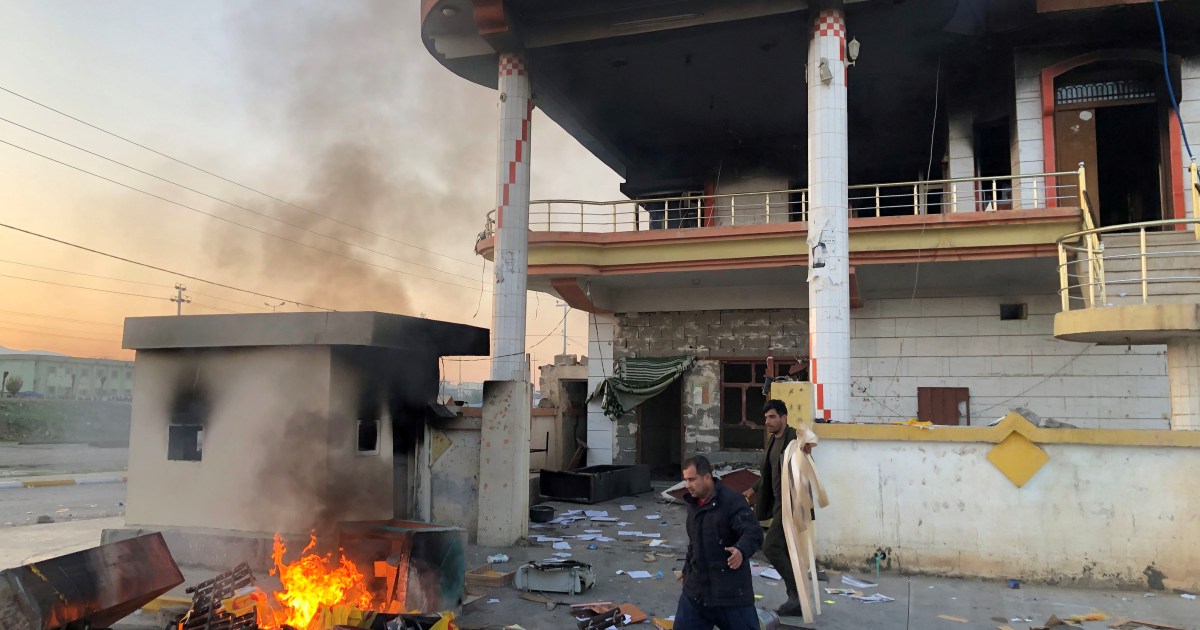The number of victims of the protests in the Kurdistan region of Iraq - against the backdrop of delayed payment of salaries and deduction of employees - has risen to 6 dead and dozens of wounded, according to what medical and official sources reported on Tuesday, while the authorities of the region announced a curfew in 4 cities.
Demonstrations against the regional government and its main parties began last week in towns in Sulaymaniyah Governorate (northeastern Iraq).
Security forces guarding party headquarters in the town of Chamchamal shot protesters on Monday, resulting in the death of a 26-year-old man, according to a medical source.
Two other protesters were killed in the evening in the towns of Kafri and Darbandikhan, according to a local official and the High Commission for Human Rights in Baghdad.
Despite the violence, demonstrations took place on Tuesday in several towns in Sulaymaniyah Governorate.
In the town of Tkiyeh (60 kilometers southwest of the Sulaymaniyah district), demonstrators tried on Tuesday to burn party headquarters and a police headquarters.
A 16-year-old protester was killed at the scene, according to a medical source, and the Human Rights Commission confirmed that one person was killed in the town.
Protests in the town of Sayed Sadiq (west of the governorate center) witnessed the killing of two demonstrators on Tuesday, according to the former deputy in the regional parliament Amid Hama Ali and the "High Commission for Human Rights."
The violence sparked condemnations from the United Nations Assistance Mission for Iraq (UNAMI), and a statement by the mission said Tuesday that "investigations must begin immediately to identify the perpetrators of the violence, and be held fully accountable."
curfew
On Tuesday, the security authorities in the Kurdistan region (northern Iraq) announced the imposition of a curfew in 4 cities in Sulaymaniyah Governorate, and 3 surrounding areas, for a period of 24 hours.
With the aim of "maintaining security".
The Supreme Security Committee in the governorate said - in a statement - that "a curfew has been decided in Sulaymaniyah, Halabja, Labrin and Karmian (surrounding areas)," and continued that "the ban is effective from midnight on Tuesday until midnight on Wednesday, in order to save Security".
Since the second of December this year, Sulaymaniyah has witnessed protests against the deteriorating economic conditions in the region, and the delay in paying public employees' salaries, in light of disagreements with Baghdad over the management of oil wealth and the distribution of its revenues.
On Monday, the President of the Kurdistan Regional Government, Masrour Barzani, accused the organizers of the protests in Sulaymaniyah province of "sabotaging stability."
The regional government has been struggling to pay employees' salaries since Baghdad stopped paying them last April, as a result of disagreements over the management of oil wealth and the distribution of its revenues, in addition to the revenues from border crossings.
The cut of salaries coincided with the decline in oil prices in global markets due to the repercussions of the Corona pandemic, which exacerbated the financial crisis in the region.
Among the population of Iraq, which numbered about 39 million people, the population of the region is estimated at 5 million, of whom 1.2 million receive salaries from the state, amounting to about $ 700 million per month.
And Iraqi President Barham Salih called on the authorities of the region to listen to the legitimate demands of the demonstrators related to improving living conditions, and not resorting to the use of violence.
The Iraqi News Agency (INA) quoted Saleh as saying - in a statement issued on Tuesday - that peaceful protest is a guaranteed constitutional right that must be respected and not overridden, and it is the right of citizens to demonstrate peacefully to demand their legitimate rights, especially those related to securing a decent living for them and their families from salaries and improving conditions and services. the public.

